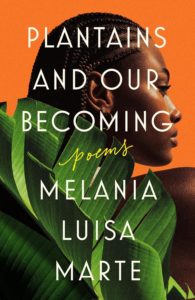Black History Month has arrived! This year’s theme is African Americans and the Arts, and here are some of the latest poetry books to celebrate with this month and all year round.
 Aster of Ceremonies is the latest work from esteemed author Jjjjjerome Ellis. Ellis seeks to connect the past and present through their work by invocating people that were once listed as runaway slaves. They seek to reform the idea of the enslaved person running away as a loss of property, to a person regaining their freedom. Furthering the connection, Ellis draws on the fact that many of these ancestors have a stutter, something that Ellis has as well. Ellis celebrates their stutter, theirs, and the ancestors,’ not only through the poetry of the work but also through music as well. Nature also is a driving force of the work, acting as authorities over the land both in the past and for Ellis in the present. Poignant and beautiful, Ellis’s work acts as a gateway into our collective past as a means to define our future.
Aster of Ceremonies is the latest work from esteemed author Jjjjjerome Ellis. Ellis seeks to connect the past and present through their work by invocating people that were once listed as runaway slaves. They seek to reform the idea of the enslaved person running away as a loss of property, to a person regaining their freedom. Furthering the connection, Ellis draws on the fact that many of these ancestors have a stutter, something that Ellis has as well. Ellis celebrates their stutter, theirs, and the ancestors,’ not only through the poetry of the work but also through music as well. Nature also is a driving force of the work, acting as authorities over the land both in the past and for Ellis in the present. Poignant and beautiful, Ellis’s work acts as a gateway into our collective past as a means to define our future.
 Plantains and Our Becoming by Melania Luisa Marte is a work that grabbles with the nature of colonialism and identity. Marte, a musician as well as a poet, looks at what it means to exist as an Afro-Latina when that word doesn’t even exist in the dictionary. The work flows through both English and Spanish and explores the experiences her families faced in their travels from the Dominican Republic and Haiti to the United States. Marte is able to take the stories passed down the generations of her family to write her own story and make a new journey of her own. Her work also explores how a woman’s beauty is a commodity to be used, as long as it does not benefit the woman herself too much. Referencing icons such as Cardi B and Megan thee Stallion, Marte shows that even with fame, femicide is still a risk. Marte’s debut work is a celebration not just of her legacy, but all those who look to define themselves.
Plantains and Our Becoming by Melania Luisa Marte is a work that grabbles with the nature of colonialism and identity. Marte, a musician as well as a poet, looks at what it means to exist as an Afro-Latina when that word doesn’t even exist in the dictionary. The work flows through both English and Spanish and explores the experiences her families faced in their travels from the Dominican Republic and Haiti to the United States. Marte is able to take the stories passed down the generations of her family to write her own story and make a new journey of her own. Her work also explores how a woman’s beauty is a commodity to be used, as long as it does not benefit the woman herself too much. Referencing icons such as Cardi B and Megan thee Stallion, Marte shows that even with fame, femicide is still a risk. Marte’s debut work is a celebration not just of her legacy, but all those who look to define themselves.
 Tender Headed is the debut work of Olatunde Osinaike and is an exploration of the intersection of masculinity and blackness. It is there that Osinaike finds himself at a crossroads of the man he was taught to be and the man he wants to become. Osinaike’s work is unafraid to put its heart on its sleeve and appear vulnerable. It is through this vulnerability that Osinaike hopes growth will happen. That in taking accountability, the current generation can hope to leave some of the pain of the past generation behind them. While there are moments of heaviness, and melancholy, there are also moments of joy and love. The author looks into a future with his own children and sees the endless possibilities if the hard work is down now. Osinaike’s work is not a condemnation of masculinity, rather a celebration of what it could be.
Tender Headed is the debut work of Olatunde Osinaike and is an exploration of the intersection of masculinity and blackness. It is there that Osinaike finds himself at a crossroads of the man he was taught to be and the man he wants to become. Osinaike’s work is unafraid to put its heart on its sleeve and appear vulnerable. It is through this vulnerability that Osinaike hopes growth will happen. That in taking accountability, the current generation can hope to leave some of the pain of the past generation behind them. While there are moments of heaviness, and melancholy, there are also moments of joy and love. The author looks into a future with his own children and sees the endless possibilities if the hard work is down now. Osinaike’s work is not a condemnation of masculinity, rather a celebration of what it could be.
Check out these works and more! Happy Black History Month!